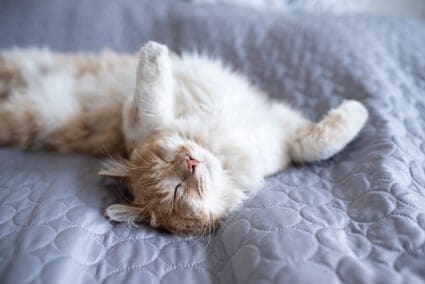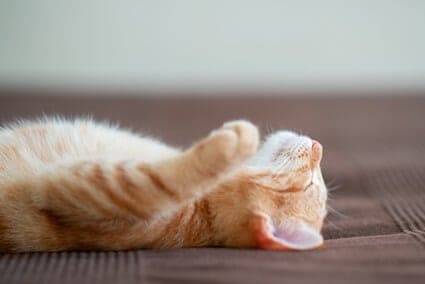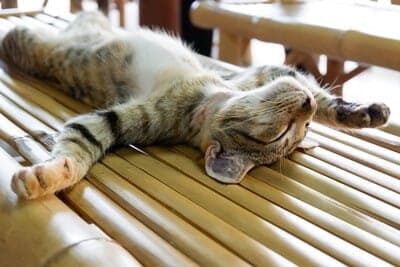Most cats sleep on their bellies with their legs tucked underneath them. They may even curl their head and tail up to conserve warmth and feel protected. This is a safe, comfortable, and normal way for cats to sleep. That makes it unusual to find your cat stretched out on its back. While it’s less common, this is perfectly normal.
Cats sleep on their backs when they feel safe and comfortable in their surroundings. If your cat is pregnant, obese, or elderly, it may be trying to take the weight off its stomach or limbs. It can be a way to absorb warmth from a sunny window or cool off on a chilly tile floor. Some cats may sleep on their backs when seeking attention. Consequently, female cats usually sleep on their backs when they are in heat to attract mates.
If your cat has a digestive issue, it may be trying to find relief on its back. As long as you’ve ruled out any medical issues, it’s not a cause for concern. While most cats never sleep on their back, if yours does, then let it enjoy itself. It feels protected in your home, comfortable on its back, and happy to relax.
Do Cats Normally Sleep on Their Backs?
Most cats do not sleep on their backs. They don’t like their bellies exposed and find it less comfortable to stretch out with their spine against the floor.
For most felines, the ideal sleeping position will always be on the belly. Lying on their paws with their body curled up provides the most warmth and protection. It even helps a cat appear smaller (and thus harder to spot by predators) when it’s sleeping. However, some cats forgo all of that to sleep:
- On their sides
- Sprawled out, with their legs extended in front and behind them
- On their backs, legs curled in or splayed out
It depends on the cat. Your feline may only do it once or make it a regular habit. It may even be based on its mood, such as when it’s feeling:
- Full and happy after a filling meal
- Warm in a sunny window
- Tired and worn out after play time
With that said, there is a higher chance of this behavior in certain cats. For example, overweight cats, pregnant cats, or cats with a digestive issue may sleep on their backs regularly. It’s not just comfort; it’s a necessity.
What Does It Mean When Cats Sleep on Their Backs?
Cats sleep for 12 to 16 hours per day, and your feline may choose to spend this time on its back. Unfortunately, there are no official studies that confirm the exact reasons for this behavior in cats. Owners still have many logical theories, though, that can explain what it means for your feline:

Feeling Safe
This position leaves a cat’s belly exposed and open to attack. If your feline is willing to ignore that and sleep on its back, it means the cat feels safe in its environment. It doesn’t expect a sneak attack from you, any objects in your home, or even other pets.
This could be the case if your feline is normally jumpy around others but feels comfortable letting its guard down around you. Some other signs that your cat feels safe include:
- Sleeping out in the open
- Stretching out on its side
- Grooming itself regularly
- Ears facing forward
Defensive Position
With that said, if a cat sleeps with belly exposed, it’s not always pure trust. The cat may be pretending to sleep, hoping that a nearby playmate (or even yourself) will make the mistake of touching its belly. The cat will be able to use all four legs to grip the offender and use its claws. It can even curl inward and use its sharp teeth.
Unlike many animals, which are at a pure disadvantage when fighting on their back, cats are rather capable in this position. Some will even purposefully roll onto their back during a fight with another cat.
It gives them a great chance to grip the top half of the creature with its front legs, and scratch at the belly with its back legs. Other signs that your cat is in defense-mode include:
- Legs gently moving as it lies on its back, preparing to strike
- Body tense and legs slightly up
- Eyes partly or fully open
If you see your cat lying in this position, you should avoid disturbing it. It’s either peacefully resting or preparing to wrestle. Most cats will give up after a few minutes and either bug you or go to sleep.
Feeling Comfortable
Your cat might find the position itself highly comfortable. Sleeping on its back can give it the chance to stretch out and rest its muscles. It may even want to expose its belly to warm sunlight or press up against a cool floor during a hot day.
As a plus, sleeping belly-up takes the cat’s body weight off its legs. That makes the behavior especially common in obese and senior cats. They may find it painful or straining to support their own weight constantly.
Senior cats are prone to developing painful joint or spinal issues. According to Topics in Companion Animal Medicine, up to 90% of senior cats suffer from osteoarthritis. If your older cat is suddenly sleeping on its back, it may be worth scheduling a checkup with a vet.
That isn’t to say fat or old cats do not lay on their backs for other reasons. Just be sure the feline isn’t breathing heavily, appearing to limp when it walks or moving slower than usual.
Tension Headaches
Cats may also lie on their backs when attempting to relieve a tension headache. This shifts part of their body weight onto the back of their skulls and redirects some of the muscle tension.
A feline can develop pain around its neck, skull, and face due to stress and tension. This can be caused by an injury, a scary change in their environment, or a poor diet.
Stomach Problems
Cats may choose to sleep on their backs due to stomach problems. It’s not uncommon for cats to develop gastritis or inflammation of their stomach lining.
This painful condition can make it difficult for cats to sit on their bellies for long periods. As a result, they may start lying on their backs to find relief. Other signs of gastritis in cats include:
- Sudden vomiting
- Decreased appetite
- Increased thirst
- Sudden lethargy or depression
- Blood in the vomit
If your cat has begun sleeping on its back and exhibits these symptoms, take it to the vet. Resting belly-up will provide some relief, but it can’t fix the problem.
Cooling Off
If your cat is overheating or just feeling toasty, it may roll onto its back to sleep. That’s especially true on tile floors or other surfaces that are cool to the touch.
Sleeping on its back will allow a cat to maximize its contact points with the cold sleeping area. The cat may also stretch out its legs to keep from retaining heat. Even its paw pads and underarms will be exposed, helping its body dispel the extra warmth.
This is harmless (and adorable) behavior, as long as your feline doesn’t have heat stroke. If it’s recently been outside during a heatwave, or your AC is not working, then look for negative symptoms. These include:
- Rapid breathing
- Vomiting
- Red tongue and mouth
- Stumbling when walking
- A rectal temperature that exceeds 105oF
Warming Up
Your cat may enact the same behavior when it feels cold. This is only true if it’s lying belly-up next to a heater, fireplace, radiator, or in a sunny window. The cat will be trying to absorb the extra heat, especially against its belly and paw pads. If the cat is chilly and there’s no clear heat source, then it’s likely to curl up and try to conserve any warmth it can.
Asking to Be Groomed
Many kittens lie on their back when they’re asking to be groomed by their mothers. This primal behavior may persist even when the cat is fully grown and no longer around its mother.
In this situation, your cat may lay on its back when it sees you. It expects you to pet, brush, or otherwise groom it. You can respond to this behavior by rubbing its head gently or picking it up to brush it.
Asking for Belly Rubs
Many people long to own a feline that enjoys belly rubs. It’s a somewhat rare trait, but certain cats do possess it. In this case, the feline will flip over and wait for you to begin scratching, patting, or rubbing its stomach.
You should definitely take your cat up on the offer. The experience will help foster a deeper bond between you two. Just be sure it’s indeed asking for a belly rub. It may also be feeling playful. In that case, it’s trying to lure you into putting your hand within range of its claws.
Attracting Mates
Felines occasionally sleep on their backs when they are in heat. This is common in female cats that are trying to attract a mate.
Females accomplish this by emitting pheromones from the glands located around their face, neck, and anus. These indicate they’re ready to breed. The scent can be easier to release and spread when they’re on their backs, exposing the anal glands.
A female cat’s heat lasts around a week. If your pet’s behavior persists for longer than this, it may be on its back for a different reason.
Pregnancy
Female cats do not exhibit a noticeable belly bump until they are several weeks into the pregnancy. However, they may still feel the weight and stomach pressure of their pregnancy before any signs are visible. This can encourage your expecting cat to lie belly-up when it sleeps. As long as it doesn’t manifest any other signs of discomfort, that’s perfectly natural.

Why Does My Cat Sleep Belly Up?
If your cat doesn’t make sleeping on its back a regular habit, it may still choose specific times to do this. Let’s explore a few instances and what they mean:
Why Do Fat Cats Sleep on Their Backs?
Fat cats sleep on their backs to give their arms and legs a break. Their body weight can take a toll on their tiny limbs. It’s easier for them to get comfortable by sleeping in this position.
Why Do Cats Lay on Their Back When They See You?
If your cat lies on its back when it sees you, it’s usually happy about your presence. It’s encouraging you to play with it, pet it, or give it attention.
Do Cats Like Sleeping on Their Back?
Some cats like sleeping on their backs and others don’t. Most cats don’t sleep belly-up because it’s a vulnerable position. Likewise, they may find it uncomfortable putting all their weight on their spine.
Other cats may love sleeping on their back. It takes the weight off their legs, lets them absorb warm or cool temperatures, and may even encourage a belly rub.
Cat Showing Belly While Sleeping
If your cat shows its belly while sleeping, it could be an invitation for a belly rub, or it may be deep asleep. You can test the waters by making your presence known with a sound and then trying to pet it. If your cat closes its eyes and starts purring, it may be enjoying it. If it starts swiping at you and meowing, you should back off.
Cats sleep on their backs for comfort and because they feel safe. There are times when it signals a health issue, but it’s usually harmless. Feel free to appreciate it. It’s an adorable habit that very few cats indulge in.

